Walker Administration Lets Building and Safety Codes Slip
Critics say anti-regulatory bent means state hasn't addressed potential hazards and adapted cost-saving advances. First of a series.
In November 2011, industry consultant Robert DuPont urged the head of the newly created state Department of Safety and Professional Services to continue the state’s tradition of using advisory councils to keep its regulatory and safety codes up to date.
“Where Wisconsin administrative codes, such as the Commercial Building Code, are based on national codes and standards, it is important to conduct timely reviews of the new editions of such national models,” DuPont wrote to DSPS Secretary Dave Ross.
DuPont, a lobbyist representing the Alliance for Regulatory Coordination, a consortium of more than a dozen state industry and public safety groups,warned Ross that failure to do so “can negatively impact both public safety and the economy in Wisconsin because products and designs offered across the nation most often reflect the newest national model regulations.”
The letter, also sent to Gov. Scott Walker and DSPS staff, drew no response, DuPont said. And the DSPS, created when Walker merged the former state Commerce Department’s Safety and Buildings Division with another agency, apparently has not heeded his advice.
Some of the councils are statutorily required, generally appointed by the governor. Others are strictly advisory, appointed by DSPS. But three-quarters of the state’s code councils dealing with buildings and safety have not met in years, and state codes for new buildings in such areas as energy conservation, electricity, plumbing and fire safety, are often years out of date, according to DuPont’s group.
Walker spokeswoman Laurel Patrick, asked to comment on the issue, issued a brief statement: “Our office is committed to ensuring the safety of Wisconsin citizens and are confident that codes are updated regularly. We are always looking for qualified individuals who are interested in serving on councils and encourage them to apply through our website: http://walker.wi.gov/governor-office/apply-to-serve.”
Ross, a former mayor of Superior, declined an interview request. DSPS spokeswoman Hannah Zillmer, while noting that some councils continue to meet, confirmed there are no active councils in several code areas. She said the agency is now taking steps to revive some of these.
“It is important to note that most advisory code councils are typically not statutorily required,” Zillmer wrote in an email. “They are convened at the pleasure of the secretary.”
Zillmer noted that some code updates have occurred even in the absence of major overhauls. She said the revision process is “a somewhat lengthy one, and is subject to outside factors such as the legislative schedule and calendar,” while maintaining “Wisconsin is not lagging behind on code adoption.” But according to the International Code Council, many states have adopted more current codes.
In two instances, Wisconsin appears to be violating state laws in its failure to maintain committees and update standards. Critics say this failure also means lost savings for homeowners and taxpayers, reduced accessibility for people with disabilities and increased dangers for building occupants.
“The codes address hazards and problems that we’ve learned about through tragedies,” said Madison Fire Marshal Ed Ruckriegel. “When you fail to adopt correct codes, you’re not maintaining your standards based on the knowledge that’s available to address those hazards.”
Advisory councils shelved
Wisconsin has long been a national leader in setting standards for new building construction.
“It was one of the first, if not the first state, to adopt a state building code,” said Ronald Buchholz, formerly deputy administrator of the Safety and Buildings Division. The law governing public buildings and places of employment took effect a century ago, in 1914.
The state now follows national and international industry model codes, new editions of which are normally released every three years. Some states adopt the new standards as is, but Wisconsin has always tweaked them in response to input from the advisory councils, members of the public and professional staff. One long-term code compliance official called these “Wisconsinisms.”
“Our focus on efficiencies and enhanced customer service will help create the pro business climate we need to create 250,000 new jobs over the next four years,” Ross declared in a press release at the time.
Under the Walker administration, the code advisory councils have largely fallen by the wayside.
A spreadsheet prepared by the Alliance for Regulatory Coordination reported that, as of mid-May, 24 of the state’s 32 code councils had not met since 2011. DSPS calendars show that has not changed since this accounting, DuPont said.
Only two councils met in 2012, the spreadsheet shows. One person who applied to serve on the electrical code council that year received an email reply from Ross, saying “the department will not be initiating an update of the commercial building code at this time and, as such, will not be appointing members to the Commercial Building Code Council or its sub-councils.”
Jean MacCubbin, DSPS’s former administrative rules coordinator, said the advisory code councils were effectively disbanded in mid-2012, with existing members being told via web posting that they needed to reapply. “No individual contacts were made, and all meetings were cancelled,” she said.
According to DSPS spokeswoman Zillmer, “the creation of an entirely new agency prompted a new organizational structure and some of the advisory code council members may have had to reapply for their positions.”
The mothballed councils include the multi-family dwelling code council, which is required by statute to meet “at least two times annually.” Wisconsin’s council has not met since February 2011, Zillmer confirmed. The state may also be violating a statute that requires it to regularly review its energy conservation code (see sidebar). There are no penalties for noncompliance.
The Wisconsin Building Code Council, a new entity created by state statute effective April 2014, is also required to meet at least twice a year. This group has yet to hold its first meeting, but Zillmer says DSPS is now “in the process of convening this council.”
Zillmer said DSPS is currently appointing new councils to advise it on the electrical and plumbing codes. She confirmed that their most recent incarnations last met in October 2011 and August 2010, respectively.
Walker did appoint members to a council to advise DSPS on revisions to the state’s uniform dwelling code, which affects one- and two-family residences. The group met several times from September 2013 through May of this year, and produced a report calling for nearly 70 code recommendations, which Zillmer said “are in the development phase.”
“The codes are getting farther and farther behind,” said Joe Jameson, electrical and building inspector for the city of Middleton. “They’re trying to slow everything down.” He does not know whether DSPS lacks staff or resources, or just doesn’t care: “They have a job to do and they’re not doing it.”
MacCubbin, who retired in June, chalks it up to anti-regulatory bias and, in her view, general incompetence.
“Their idea is to get rid of people who write codes, because that’s regulation,” said MacCubbin, a former Madison City Council member who worked most of her 24 years with the state in code enforcement. She said the appointees who took over after DSPS was formed “were clueless about long-term planning and how things work.”
Updates take much longer
Joe Hertel, formerly the state’s chief electrical inspector, once oversaw the state’s process of revising state building and safety-related codes in several areas. “We could do it nine months, start to finish,” he said in an interview.
But now, due to agency inertia and changes to state law governing administrative rules, including a requirement that proposed changes be approved by the governor before they may be submitted to the Legislature for review, Hertel said “it’s at least a two-year process.”
Indeed, it took until Dec. 1, 2013, for the state to update its electrical code based on 2011 national model revisions, which were available for review in September 2010.

Joe Hertel, formerly the state’s chief electrical inspector, says the process of updating the state’s electrical code once took nine months and is now at least a two-year process. While 25 states will have adopted the 2014 code by Jan. 1, Hertel doubts that Wisconsin will do so before 2017. Lauren Fuhrmann/Wisconsin Center for Investigative Journalism
Now, Hertel says, “we’re going to be lucky” if the 2014 electrical code is passed by 2017 — when a new code will be out. As of Sept. 1, according to the national Electrical Code Coalition, the 2014 code had already been adopted in 15 states, with 10 more poised to do so by Jan. 1.
Hertel left the agency in mid-2012 after it called for eliminating requirements to add safety devices including arc and ground fault circuit interrupters in new homes. This decision, made at the urging of the Wisconsin Builders Association, an industry trade group, was rescinded amid intense opposition.
“When you have to do things that go against your better judgment, your morals and your ethics, it’s time to do something else,” Hertel said. He believes the agency is no longer committed to making decisions based on sound industry practices: “Under this administration, it’s just hit and miss and let’s get re-elected.”
Monte Ewing, formerly one of DSPS’s four regional electrical consultants, said the 2014 code requires “an awful lot” of new electrical safety features, especially for new one- and two-family buildings. “We expect the Builders Association to come out screaming,” he said.
Brad Boycks, vice president of advocacy for the Wisconsin Builders Association, said his group will monitor and “chime in” on any proposed changes to the code. “There’s always a delicate balance to be set between cost considerations and safety considerations,” he said.
The importance of being current
The question of motivation hangs heavily over the issue of the state’s approach to keeping its building codes current. Who benefits from the delays?
Jameson says the only winners he can think of are builders, who may wish to avoid the expense of new requirements. Homeowners and taxpayers, he said, can only lose, by not getting the benefit of code changes that increase safety and save money.
James B. Smith, chief building inspector for the city of Waukesha, noted that while some code revisions mean higher costs for builders, others have the opposite effect. “Requirements are often relaxed,” Smith said. “Materials that have been found to be safe are now allowed.”
According to Smith, each new code brings “hundreds and hundreds of things” that make buildings safer and more efficient. One key building code area is improved accessibility for people with disabilities — or, as Smith put it, “not allowing the physical environment to discriminate against those individuals.”
As a professional engineer who formerly worked for the Safety and Buildings Division, Smith “can’t imagine not using the most current standards.”
Ruckriegel, the Madison fire marshal, said past code revisions made outpatient care facilities subject to some of the same fire-safety rules as hospitals. He expects new fire codes to include standards for increasingly popular open flame fireplaces in public buildings; current codes do not.
And Jeffrey M. Hugo, manager of codes for the National Fire Sprinkler Association, noted that the 2012 code, which 21 states have adopted but Wisconsin has not, mandated that automatic sprinklers be installed on building floors that contain ambulatory health care facilities like surgery centers and dentist offices as well as on all lower floors.
“If the construction boom in this area ends before (Wisconsin adopts) the 2012 code,” Hugo said, “we’ll have a whole bunch of these health care facilities that do not have sprinklers throughout the building.”
Bill Neitzel, an electrical and heating inspector for the city of Madison, said the state’s failure to keep its electrical code up to date means that new construction lacks the latest improvements in technology and practices and creates confusion regarding code enforcement.
At a recent meeting of building and electrical inspectors planning a series of training sessions, Neitzel said the question arose: “Do we train on the 2014 code or the 2011?” A decision was made to use the 2011 standards, because of uncertainty over whether and when the newer standards would be in place.
A former member of the electrical code advisory council, which has not met since 2011, Neitzel blames the state’s failure to keep the councils running and its codes up to date on the current administration’s anti-regulatory bent: “There’s a force there that wants to show they’re consumer friendly, open for business, and we don’t want anybody standing in your way.”
But Neitzel believes safety and efficiency should be pre-eminent concerns. He recalls the 2003 tragedy in which 100 people were killed and more than 200 injured in a nightclub fire in Rhode Island, blamed in part on the absence of sprinklers and wired alarm systems, now mandatory.
“That’s the kind of thing we as enforcement officials are worried about,” Neitzel said. “We all send our families into these buildings. We want them to be safe.”
Getting back on track?
DuPont, formerly the Safety and Buildings Division’s director of program development, said his group is eager to get the state’s code-revision process back on track.
“Alliance members support the codes being updated on a periodic basis,” said DuPont, the group’s founder. “They’d like to see the code councils active.”
The group’s members include Associated Builders and Contractors of Wisconsin, a construction industry trade group, as well as the Wisconsin State Fire Chiefs Association and other building safety organizations.
While DuPont is concerned about the state’s failure to keep its codes current, he is diplomatic in not ascribing blame, saying “I don’t know that anyone has a plan to slow things down.” He notes that DSPS, like other state agencies, has in recent years seen some of its program revenues redirected to the state’s general fund. He hopes this practice will not be renewed past the current budget cycle, which ends in mid-2015.
Scott Satula, president of the nonprofit Wisconsin Code Officials Alliance, also suggested that DSPS is doing the best it can with limited resources. “The department is trying to get their arms around all the things they need to do,” he said. “They just don’t have enough staff.”
Satula said the agency is trying to get the advisory councils up and running again. “It’s taking longer than we thought it would. We’re trying to help them any way we can.”
Steve Breitlow, business manager for Plumbers Union Local 75, expressed concern that the state plumbing code was last revised in early 2011 but noted that DSPS is now taking steps to form a new advisory council.
“We’re looking forward to it being re-formalized and taking some steps to update our codes,” he said.
Bill Lueders is the Money and Politics Project director at the Wisconsin Center for Investigative Journalism (www.WisconsinWatch.org). The Center produces the project in partnership with MapLight.
The Center collaborates with Wisconsin Public Radio, Wisconsin Public Television, other news media and the UW-Madison School of Journalism and Mass Communication. All works created, published, posted or disseminated by the Center do not necessarily reflect the views or opinions of UW-Madison or any of its affiliates.


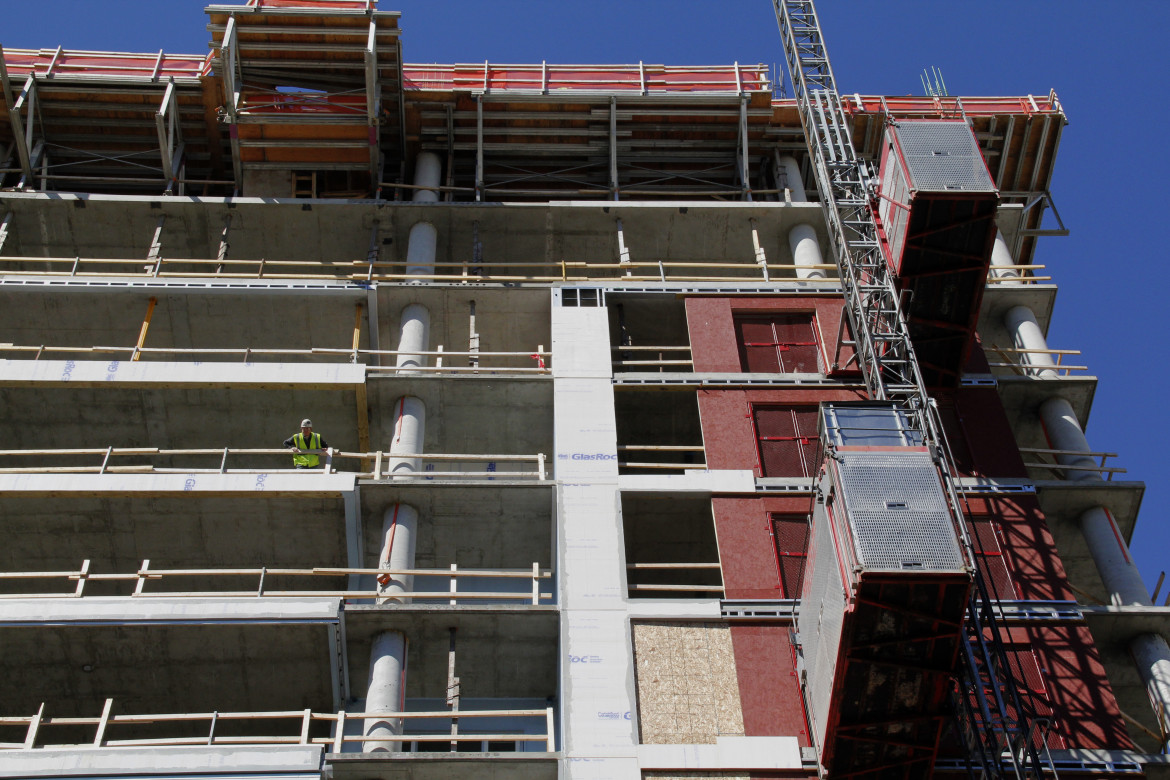

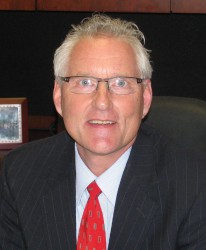
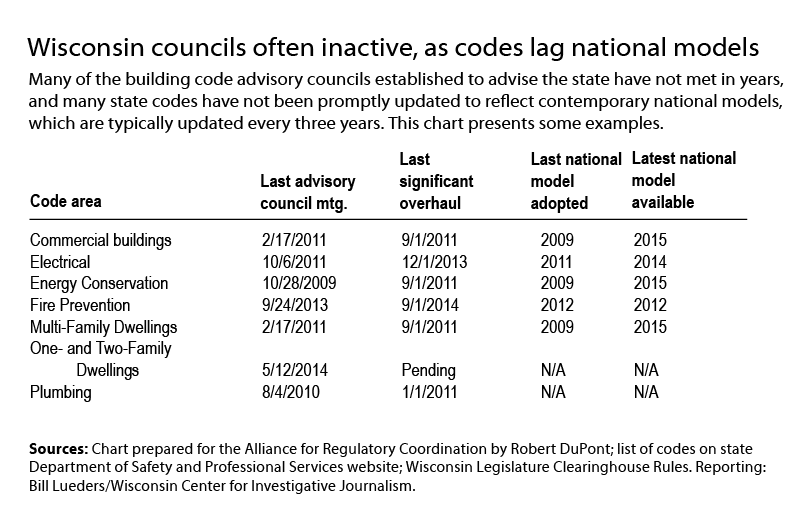
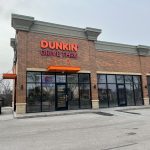



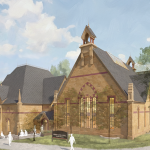















It is called the demolition by neglect form of management. Essentially let the next guy worry about falling down buildings and pot hole roads and hopefully it does not happen on your watch. An example would be the County Parking structure that had falling facades that killed and injured a person, fire in the Courthouse from long neglected and needed electrical upgrades, and the War Memorial that needs millions in repairs that Walker left behind and the image that he cut taxes. It is just a tool and attitude to shift the burden forward to someone else other than me.
It is governance and management by a class of “idiotes” (from the Greek definition). We have the least educated governor and legislature in modern history that is clueless other than their marching orders from corporate benefactors.
I agree. I know this is a bit off subject, but I hope we take the arena opportunity to address the issue of dedicated funding for our cultural amenities. They are in terrible condition. The parking ramp that was mentioned above is not alone. Take a close look at the Art Museum, Zoo, etc. We’re starving these places to death.
The race to the bottom is picking up speed.